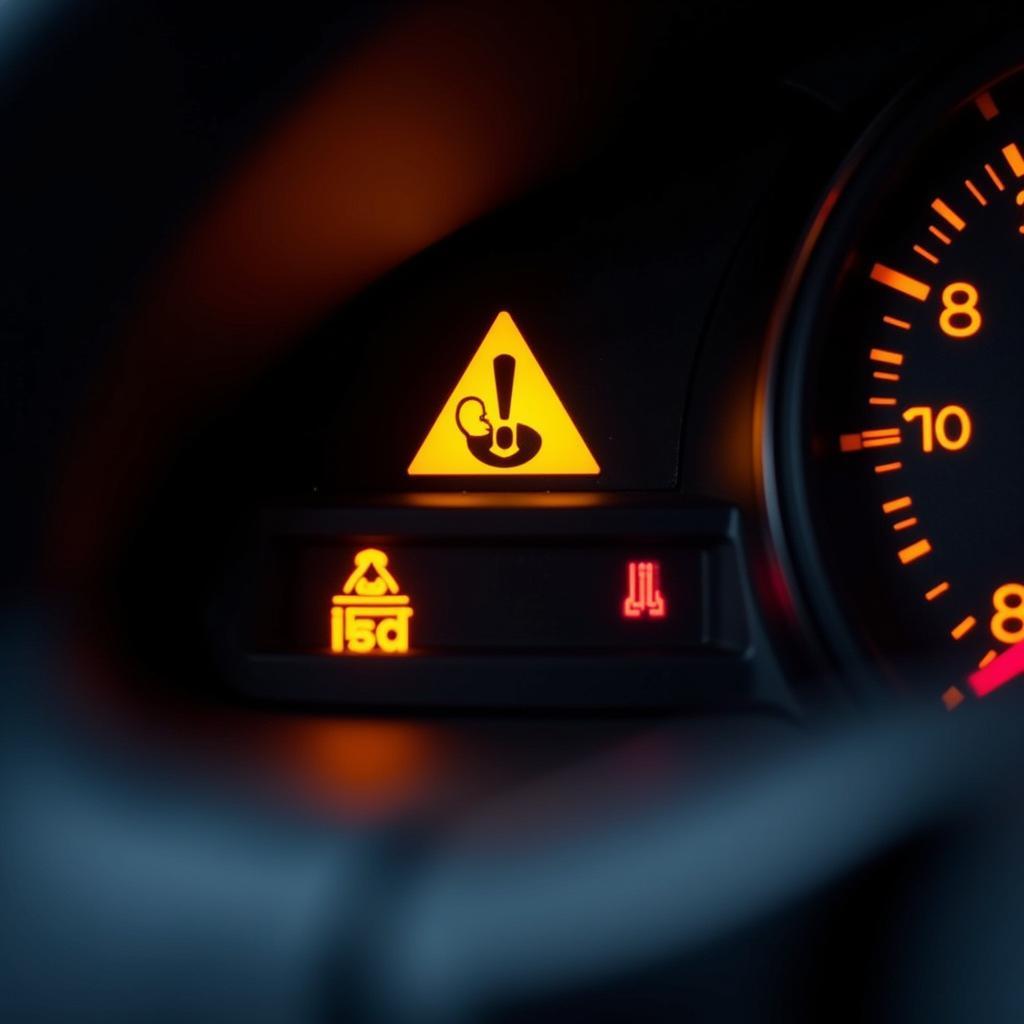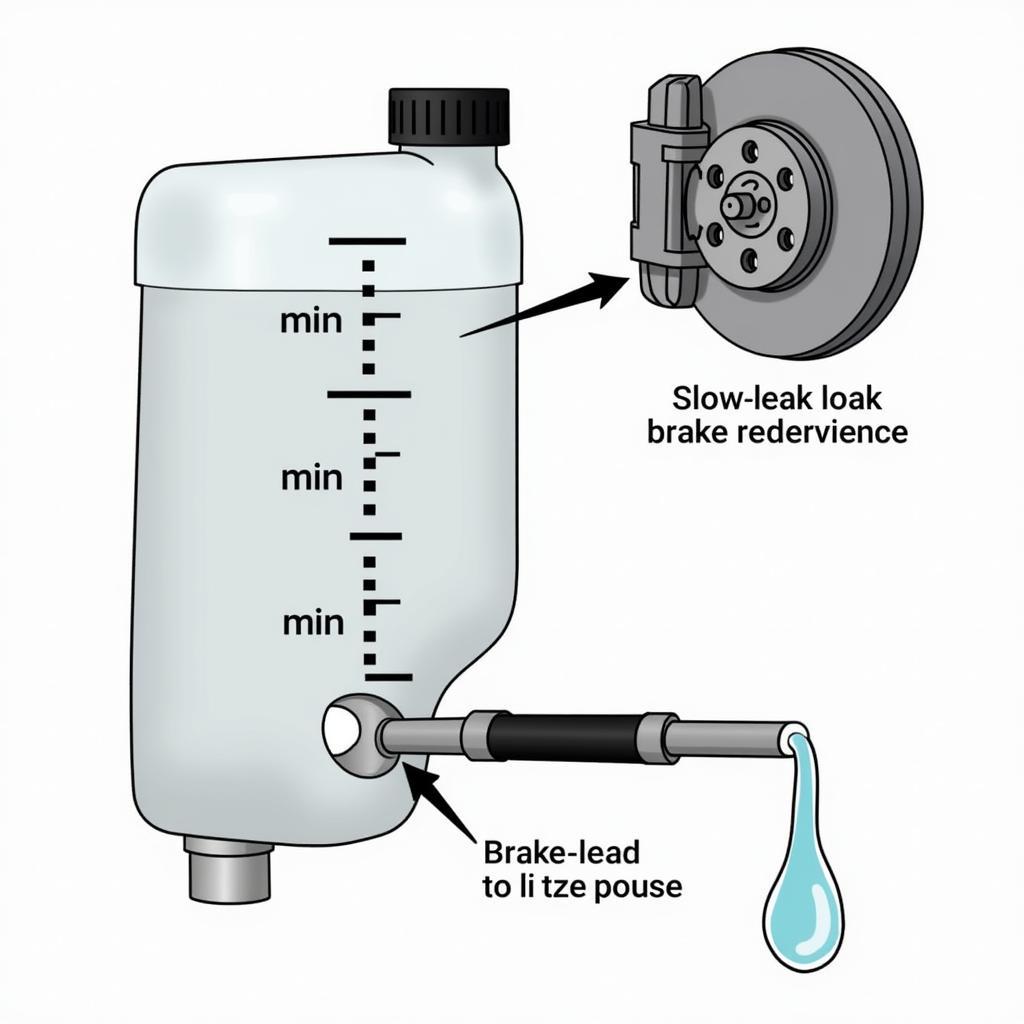The yellow brake warning light on your Toyota Prius can be a heart-stopping sight for any driver. It usually pops up unexpectedly, leaving you wondering about the severity of the issue and what steps you should take next. While it’s not an immediate safety hazard like the red brake warning light, ignoring it can exacerbate the underlying problem and even lead to dangerous situations on the road.
This comprehensive guide delves into the common causes behind a yellow brake warning light in a Prius and provides actionable steps to diagnose and address the issue effectively.
Decoding Your Prius’s Yellow Brake Light
Your Prius uses a sophisticated system of sensors and warning lights to communicate potential issues. Unlike the red brake light, which indicates critical braking system malfunctions, the yellow brake light typically points to a problem with your anti-lock braking system (ABS) or electronic stability control (ESC).
 Prius dashboard with yellow brake warning light illuminated
Prius dashboard with yellow brake warning light illuminated
Here’s a breakdown of what the yellow brake light could mean:
- ABS Issue: The ABS prevents your wheels from locking up during hard braking, allowing you to maintain steering control. If there’s a fault within the ABS system, the yellow brake light will illuminate.
- ESC Malfunction: The ESC system helps you maintain control of your car on slippery surfaces or during sudden maneuvers. A malfunctioning ESC can trigger the yellow brake warning light.
- Low Brake Fluid: Although less common, low brake fluid can sometimes activate the yellow brake light in conjunction with the red brake light.
Common Causes and Troubleshooting Tips
Identifying the root cause of the yellow brake warning light is crucial to determining the correct course of action.
1. Faulty Wheel Speed Sensor
The wheel speed sensors are a vital component of both the ABS and ESC systems. These sensors relay wheel speed information to the car’s computer. A malfunctioning or dirty sensor can disrupt this data flow, triggering the warning light.
Solution: Inspect the wheel speed sensors for any visible damage or debris buildup. Cleaning the sensors can sometimes resolve the issue. However, if a sensor is faulty, it will need to be replaced.
2. Malfunctioning ABS Control Module
The ABS control module is the brain behind your anti-lock braking system. It receives data from the wheel speed sensors and modulates brake pressure accordingly. A failing ABS control module can disrupt the entire system.
Solution: Diagnosing a faulty ABS control module requires specialized diagnostic equipment. If you suspect an issue with this component, it’s best to consult a qualified mechanic or Toyota dealership.
 Mechanic inspecting the ABS system of a car
Mechanic inspecting the ABS system of a car
3. Worn-Out Brake Pads
While worn brake pads primarily trigger the brake pad wear indicator light, they can, in some cases, contribute to a yellow brake warning light.
Solution: Check your brake pads for wear and tear. If they are nearing the end of their lifespan, replace them with new ones.
4. Low Battery Voltage
Surprisingly, a weak battery can also cause a cascade of electrical problems, including a false yellow brake warning light.
Solution: Check your battery’s voltage. If it’s low, charge it or replace it if necessary.
Addressing a Yellow Brake Warning Light: A Step-by-Step Guide
- Safety First: If the yellow brake warning light illuminates while driving, pull over to a safe location as soon as possible.
- Check Warning Lights: Note if any other warning lights are illuminated on your dashboard, such as the check engine light or VSC warning light.
- Visual Inspection: Conduct a visual inspection of your brake system, looking for any visible signs of damage, leaks, or wear and tear.
- Consult Your Owner’s Manual: Your owner’s manual provides specific information about your car’s warning lights and recommended actions.
- Professional Diagnosis: If you can’t pinpoint the issue yourself, it’s crucial to have your Prius inspected by a qualified mechanic specializing in Toyota hybrid systems.
Remote Diagnostic and Programming Services for Your Prius
In today’s technologically advanced world, you can access specialized services for your Prius remotely.
For instance, if you’re experiencing a yellow brake warning light, you can connect your car to a remote diagnostic service. This service allows expert technicians to analyze your Prius’s system remotely, pinpoint the issue, and provide you with tailored solutions.
2008 prius brake switch warning lights
Furthermore, suppose your issue stems from a software-related malfunction within your car’s ABS or ESC system. In that case, remote reprogramming services can help address the problem.
These remote services offer a convenient and efficient way to address modern car issues without leaving your home.
Don’t Ignore the Yellow Light
A glowing yellow brake warning light on your Prius shouldn’t be disregarded.
“Many drivers make the mistake of thinking the yellow light is less serious than the red light, so they put off getting it checked,” says John Miller, a seasoned Toyota mechanic with over 20 years of experience. “But ignoring a yellow brake light can lead to more extensive damage and costlier repairs down the line.”
toyota prius brakes warning lights
Remember, addressing any potential issues promptly ensures your safety and helps keep your Toyota Prius in peak condition for miles to come.

